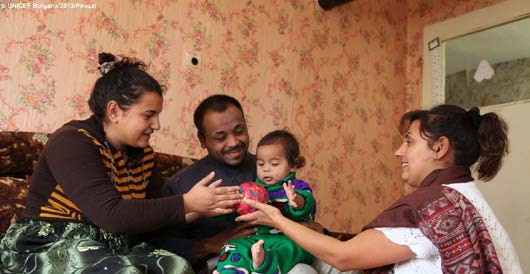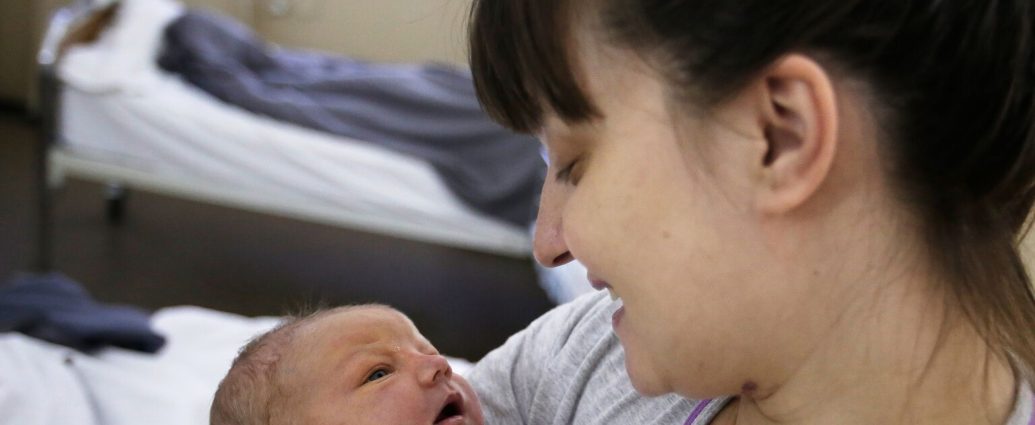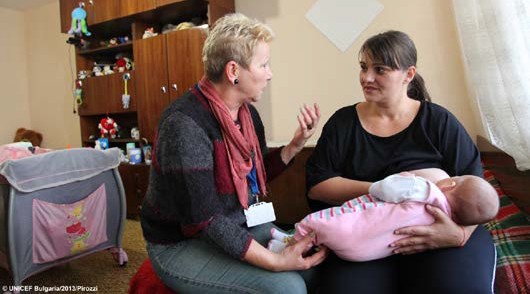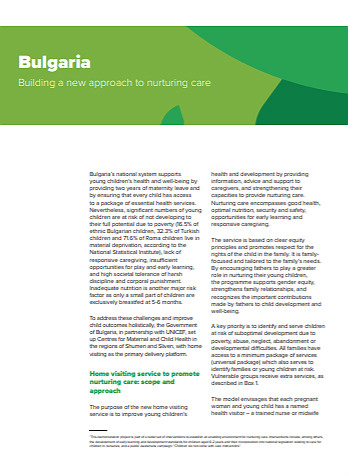Bulgaria’s national system supports young children’s health and well-being by providing two years of maternity leave and by ensuring that every child has access to a package of essential health services. Nevertheless, significant numbers of young children are at risk of not developing to their full potential due to poverty (16.5% of ethnic Bulgarian children, 32.3% of Turkish children and 71.6% of Roma children live in material deprivation, according to the National Statistical Institute), lack of responsive caregiving, insufficient opportunities for play and early learning, and high societal tolerance of harsh discipline and corporal punishment. Inadequate nutrition is another major risk factor as only a small part of children are exclusively breastfed at 5-6 months.
To address these challenges and improve child outcomes holistically, the Government of Bulgaria, in partnership with UNICEF, set up Centres for Maternal and Child Health in the regions of Shumen and Sliven, with home visiting as the primary delivery platform.
Home visiting service to promote nurturing care: scope and approach
The purpose of the new home visiting service is to improve young children’s health and development by providing information, advice and support to caregivers, and strengthening their capacities to provide nurturing care. Nurturing care encompasses good health, optimal nutrition, security and safety, opportunities for early learning and responsive caregiving.
The service is based on clear equity principles and promotes respect for the rights of the child in the family. It is family- focused and tailored to the family’s needs. By encouraging fathers to play a greater role in nurturing their young children, the programme supports gender equity, strengthens family relationships, and recognizes the important contributions made by fathers to child development and well-being.
A key priority is to identify and serve children at risk of suboptimal development due to poverty, abuse, neglect, abandonment or developmental difficulties. All families have access to a minimum package of services (universal package) which also serves to identify families or young children at risk.
Vulnerable groups receive extra services, as described in Box 1 below.
| Box 1. Services proportionate to need The universal package consists of two home visits during pregnancy (early in pregnancy and during the last month) and seven home visits after the birth and up to age 3: within 14 days after birth; at the beginning of the second month; at 4-5 months; and then around the 9th, 12th, 24th and 36th months. The services offered include information, advice and counselling, needs assessment, psychological support, and linking and referring families to other services, as necessary. Some families receive additional support (universal plus) to help with specific issues such as child sleeping problems, maternal depression, problems with breastfeeding, etc. These services are offered only as needed and until the problem has been addressed. Indicated services are provided for children and families at high risk and with complex needs (e.g. children at risk of developmental problems or with disabilities; pregnant women without health insurance; teenage mothers; preterm babies; children in poor families or families living in substandard conditions; children at risk of abandonment or abuse, foster parents, etc.). These services consist of high intensity support and structured interventions. |
|---|
The model envisages that each pregnant woman and young child has a named health visitor – a trained nurse or midwife – working in close collaboration with health and other relevant service providers in the community, including social welfare and child protection services.
“In the beginning, I was afraid to touch my babies… With time, I learnt a lot from the visiting nurse: how to feed my babies properly, how to communicate with them, what kind of play supports their development. I do not know if I could have managed without her.”
A mother of low birth-weight twins
How the home visiting service is organized and supported

Home visiting in the demonstration areas is part of the outpatient care provided by health facilities. Nurses, a social worker and a team leader are responsible for home visiting. In Sliven, a Roma Health Mediator and nurses of Roma origin facilitate the provision of services, as they speak the language, understand the culture and have the trust of Roma families. The services collaborate closely with the two Regional Ministry of Health Inspectorates, local physicians, hospitals and child and social protection services who refer vulnerable families for participation.
To support home visitors in promoting nurturing care for young children, the Government, UNICEF, and partners have strengthened the following system components:
- with support from faculty of the Medical University in Varna and social service providers, continuous in-service training in all components of nurturing care and supervision, are being provided to home visiting staff;
- referral mechanisms to facilitate support for children and families with multiple and complex needs have been developed with a diverse range of stakeholders and agencies; and
- joint planning and coordination processes have been established at local level with the participation of health-care providers, child protection departments and social service providers to better support vulnerable families.
Implementation challenges
- Bulgaria’s highly privatized health-care system made it necessary to establish home visiting as a separate service, which constrains collaboration. Also, the independently working general practitioners lack consensus on important issues of infant care (for example, on breastfeeding and weaning) which can undermine the advice given by home visitors to families.
- There is a shortage of qualified staff, particularly outside the big cities; and uninsured women have limited contact with providers because of their limited entitlements.
- The regions lack important social, health and educational services in the community, including for addressing such issues as paediatric and maternal mental, health, etc.
- As the programme is being rolled out, investment in implementation research is needed to strengthen key elements of the scale-up process and to monitor outcomes.
Implementation challenges are being addressed by: a strong network of social service providers (particularly in the region of Shumen) to assist with the complex social needs of families and children; effective collaboration and referral mechanisms between home visitors and local social service, health and education service providers; and strong support from the Regional Health Inspectorates and regional authorities.
Evidence of impact
Because support is tailored to the individual needs of the families and delivered in a culturally sensitive way, home visiting has made important progress in reaching out to vulnerable groups, including approximately 66%2 of pregnant women without insurance.
Relevant stakeholders and caregivers are aware of the service and recommend it to families. On average, 67% of the child population is participating. The service has contributed to early identification of children at risk of developmental difficulties and under nutrition. Preliminary findings from a cohort study indicate improvements in breastfeeding practices among mothers participating in the home visiting service, even though the non-participating control group was characterized by more favourable conditions.
A brighter future
The Ministry of Health is preparing to introduce home visiting throughout the country, rolling out the services to 26 new regions, as part of measures included in the updated action plan to implement the national strategy “Vision for deinstitutionalization of children in Bulgaria”. Funding for the first two years will be provided under the EU Operational Programme “Human Resource Development”. The primary target population is children aged 0–2 years and their caregivers.
| “We appreciate the efforts of UNICEF in initiating this process ... and now we are working to ensure its sustainability. We hope to establish a home visiting centre in every regional town and to reach the homes of all families and children in Bulgaria.” Ministry of Health ECD expert3 |
|---|
For more information, please contact NurturingCare@who.int
Endnotes
1 This demonstration project is part of a wider set of interventions to establish an enabling environment for nurturing care. Interventions include, among others, the development of early learning and development standards for children aged 0-2 years and their incorporation into national legislation relating to care for children in nurseries, and a public awareness campaign: “Children do not come with care instructions”.
2 Calculated as the number of uninsured pregnant women supported by home visiting compared with the total number of uninsured women who gave birth during the previous year (2016).
3 Early childhood development in Bulgaria: a study of the system supporting ECD, interconnection and interaction between them and the parents, published in 2018 (download in Russian)
Acknowledgements: This profile was developed in support of Nurturing Care for Early Childhood Development. A framework for helping children to survive and thrive to transform health and human potential.
Writer: Vera Rangelova, UNICEF, Bulgaria. Contributors to development and review: Matthew Frey, Bettina Schwethelm. Design: PATH.







